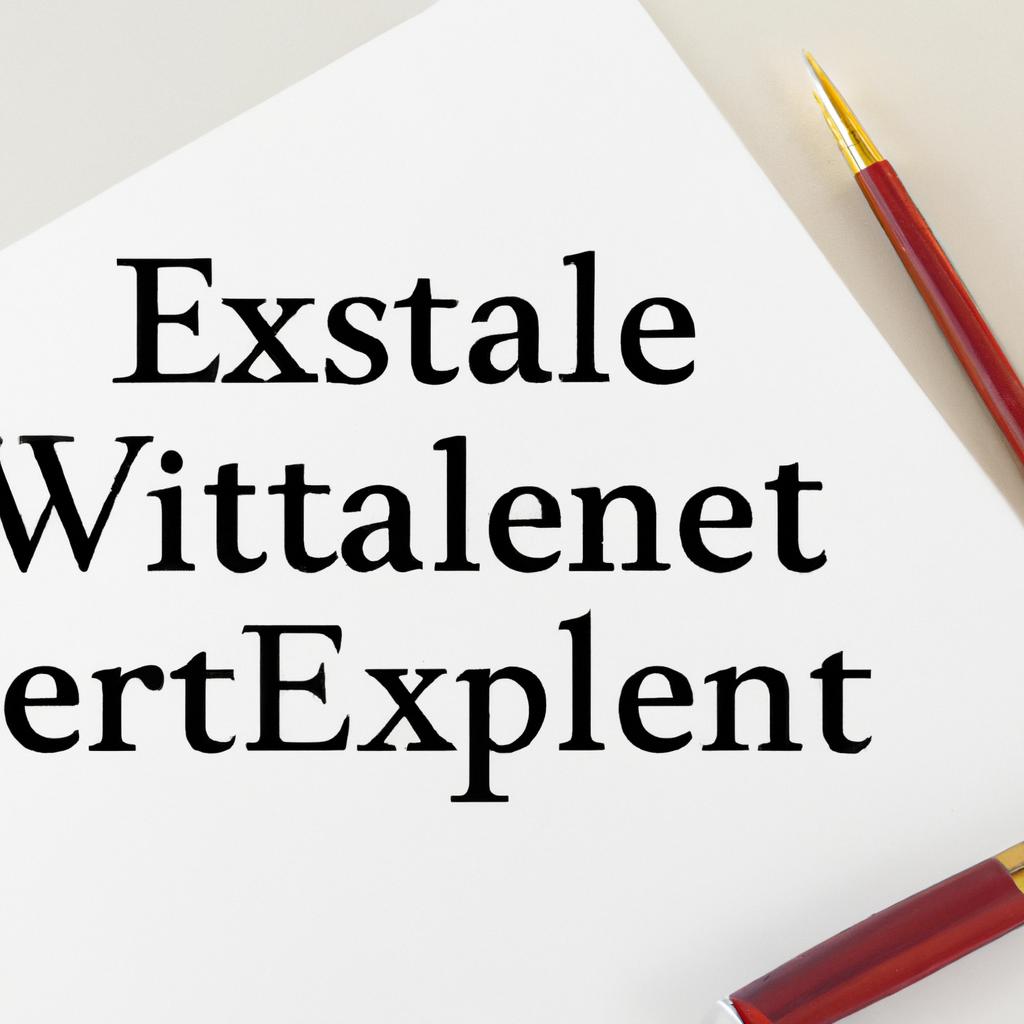When it comes to securing your legacy and ensuring your loved ones are protected, there are few legal tools as essential as creating a will and trust. At Morgan Legal Group in New York City, our experienced team specializes in estate planning, probate, elder law, and the creation of Wills and trusts. In this article, we will explore the importance of establishing a comprehensive estate plan through the creation of a will and trust, providing you with the peace of mind that your assets will be distributed according to your wishes.
Understanding the Importance of Creating a Will and Trust
Creating a will and trust is crucial in ensuring that your assets are distributed according to your wishes after you pass away. A will is a legal document that outlines how your assets should be distributed and who will be responsible for carrying out your wishes. By creating a will, you can ensure that your loved ones are taken care of and that your assets are distributed in the way you see fit.
Additionally, a trust can help you protect your assets and provide for your beneficiaries in a more structured way. By placing your assets in a trust, you can avoid the lengthy and costly probate process, maintain privacy, and potentially reduce estate taxes. Trusts can also be used to provide for specific needs of your beneficiaries, such as education expenses or healthcare costs. Overall, creating a will and trust is essential in securing your legacy and ensuring that your wishes are carried out after you are gone.

Key Considerations When Establishing a Trust
When establishing a trust, there are several key considerations that must be carefully thought out to ensure it aligns with your wishes and goals. One important aspect to consider is the type of trust that best suits your needs. Whether it be a revocable trust that can be amended during your lifetime or an irrevocable trust that cannot be changed once established, each type has its own advantages and implications.
Another crucial consideration is selecting the right trustee to manage and distribute the assets held in the trust. Trustee duties are significant and require someone trustworthy, responsible, and competent to handle the responsibilities effectively. Additionally, determining the beneficiaries of the trust and outlining their rights and restrictions is essential to ensure that your assets are distributed according to your wishes.

Ensuring Your Assets are Protected Through Proper Estate Planning
One of the most effective ways to ensure that your assets are protected and distributed according to your wishes is to create a will and trust. A will is a legal document that outlines how you want your property and assets to be distributed after your passing, while a trust is a legal arrangement that allows a third party, or trustee, to hold assets on behalf of beneficiaries.
By having a will and trust in place, you can avoid the probate process, minimize estate taxes, and ensure that your loved ones are taken care of. Additionally, a trust can provide privacy and control over how your assets are distributed. Our team at Morgan Legal Group can help you create a comprehensive estate plan that includes a will and trust to protect your assets and provide peace of mind for you and your family.

Expert Guidance on Crafting a Comprehensive Will and Trust
When it comes to planning for the future, crafting a comprehensive will and trust is essential to ensure that your assets are distributed according to your wishes. At Morgan Legal Group, our team of experienced estate planning attorneys is here to provide expert guidance every step of the way. Whether you are looking to create a will, set up a trust, or update existing estate plans, we have the knowledge and expertise to help you navigate the complexities of estate planning.
With our personalized approach, we will work closely with you to understand your unique situation and goals. Our attorneys will carefully draft your will and trust documents to reflect your wishes accurately and ensure that your assets are protected for future generations. By working with Morgan Legal Group, you can have peace of mind knowing that your estate is in good hands.
Q&A
Q: Why do I need a will and trust?
A: Having a will and trust ensures that your assets are distributed according to your wishes after your passing.
Q: Can I create a will and trust on my own?
A: It’s recommended to seek legal assistance when creating a will and trust to ensure it is valid and complies with state laws.
Q: What’s the difference between a will and a trust?
A: A will dictates how your assets are distributed after your passing, while a trust allows you to transfer assets to beneficiaries while you are still alive.
Q: Who should I choose as my executor and trustee?
A: Select someone you trust and who is capable of managing your assets and following your wishes outlined in your will and trust.
Q: Can I make changes to my will and trust after it’s been created?
A: Yes, you can update your will and trust as your circumstances change, such as marriage, divorce, or the birth of children. It’s important to review and update these documents regularly.
To Wrap It Up
In conclusion, creating a will and trust is an essential step towards securing your legacy and ensuring that your wishes are carried out after you’re gone. By taking the time to carefully outline your intentions and appoint trusted individuals to oversee your assets, you can provide peace of mind for both yourself and your loved ones. So don’t delay, start the process of establishing your will and trust today and take control of your future. Your legacy awaits.
 Creating a will and trust is a crucial step in protecting your assets and ensuring your final wishes are carried out. Far too often, people put off creating these important documents, assuming they have plenty of time or that they don’t need one. However, the truth is that everyone, regardless of age or wealth, should have a will and trust in place to ensure their assets are passed down according to their wishes and to avoid potential legal disputes among loved ones. In this article, we will discuss the importance of creating a will and trust, the benefits and practical tips for doing so, and provide first-hand experiences and case studies to help guide you through the process.
Creating a will and trust is a crucial step in protecting your assets and ensuring your final wishes are carried out. Far too often, people put off creating these important documents, assuming they have plenty of time or that they don’t need one. However, the truth is that everyone, regardless of age or wealth, should have a will and trust in place to ensure their assets are passed down according to their wishes and to avoid potential legal disputes among loved ones. In this article, we will discuss the importance of creating a will and trust, the benefits and practical tips for doing so, and provide first-hand experiences and case studies to help guide you through the process.
Why Create a Will and Trust?
A will and trust are legal documents that outline your final wishes for your assets and estate. They specify who will inherit your property, money, and other possessions after you pass away. Having a clear and legally binding will and trust in place can provide you with peace of mind knowing that your loved ones will be taken care of and your assets will be distributed according to your wishes.
Without a will and trust, your estate will follow the state’s intestate laws, which can result in your assets being distributed in a way that you may not have intended. For example, if you are married with children and pass away without a will, your spouse will typically only inherit a portion of your estate, with the rest being divided among your children. This can cause financial strain and potential disputes among family members.
Additionally, creating a will and trust can help minimize the stress and burden on your loved ones after your passing. Without one, your family may have to endure a lengthy and expensive probate process to distribute your assets, which can also cause tension and conflict among family members. By having a will and trust in place, you can help your loved ones avoid these potential headaches and focus on grieving and healing.
Benefits of a Will and Trust
1. Your Wishes Will Be Honored
The primary purpose of a will and trust is to ensure that your final wishes are carried out. Without one, your assets may be divided and distributed in a way that you would not have desired. For example, you may want to leave a specific item or sum of money to a certain family member or charity, which can only be guaranteed through a legally binding will and trust.
2. Protect Your Children’s Future
If you have minor children, creating a will and trust is essential to ensure their future financial stability and well-being. A will and trust can specify who will be the guardian of your children in the event of your passing, as well as who will manage their inheritance until they come of age. Without a will and trust, these important decisions may be left up to the court, which may not align with your wishes.
3. Avoid Legal Disputes
In the absence of a will and trust, there is potential for family members to dispute over your assets and the distribution of your estate. This can lead to lengthy and expensive legal battles that can strain relationships and cause unnecessary stress. By having a clear and legally binding will and trust, you can help minimize the chances of potential disputes among your loved ones.
4. Minimize Probate Costs
Probate is the legal process of distributing a deceased individual’s assets and can be costly, time-consuming, and public. By having a comprehensive will and trust, you can bypass the probate process, saving your loved ones time and money. This is especially important if you have a complex or large estate, as the probate process can significantly reduce the amount of money your beneficiaries receive.
Practical Tips for Creating a Will and Trust
1. Seek Professional Assistance
Although you can create a will and trust on your own, it is highly recommended to seek the help of a professional, such as an estate planning attorney. They have the knowledge and experience to ensure that your will and trust are legally binding and accurately reflect your wishes. They can also provide guidance on potential tax implications and help you navigate through any complex family dynamics.
2. Keep Your Documents Updated
It’s essential to review and make updates to your will and trust regularly. Life circumstances, such as the birth of a child, marriage, divorce, or changes in financial status, may require revisions to your documents. It’s also important to keep them in a secure location and let your loved ones know where they can find them in the event of your passing.
3. Consider Your Digital Assets
In today’s digital age, it’s important to consider your digital assets when creating a will and trust. This can include social media accounts, online banking, or even valuable digital files. Be sure to include instructions for how you want these assets to be managed or distributed in your will and trust to avoid potential complications for your loved ones.
Case Studies and First-Hand Experiences
Case Study 1:
John and Sarah had been married for 15 years and had two children together. Unfortunately, John suddenly passed away in a car accident, leaving behind a significant inheritance for his family. Since he had not created a will and trust, his assets were distributed according to state laws, meaning Sarah only inherited a portion of his estate, with the rest divided among their children. This caused financial strain for Sarah and their children, who were not yet old enough to manage their inheritance.
Case Study 2:
Jennifer, a successful business owner, passed away without a will and trust. Her family was unaware of her financial situation and the extent of her assets. This resulted in a long and expensive legal battle among her siblings who were fighting over her business and assets. If Jennifer had created a will and trust, she could have specified who would inherit her business and avoid potential disputes among her family members.
First-Hand Experience:
“I always thought that creating a will and trust was only necessary for wealthy people. However, after my father suddenly passed away, I realized the importance of having these documents in place. Without a will and trust, my siblings and I had to go through a lengthy probate process, which caused a lot of stress and tension among us. I now have my own will and trust in place to ensure my loved ones are taken care of and to avoid potential legal battles in the future.” – Sarah, 38.
In conclusion, creating a will and trust is a crucial step in protecting your assets and ensuring your final wishes are carried out. By having these legal documents in place, you can provide peace of mind for yourself and your loved ones, avoid potential disputes and minimize the financial burden on your heirs. Seek professional assistance and consider your unique circumstances to ensure that your will and trust accurately reflect your wishes and provide protection for your loved ones.





